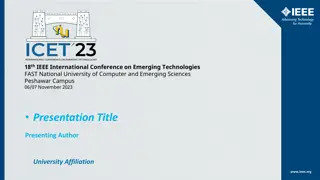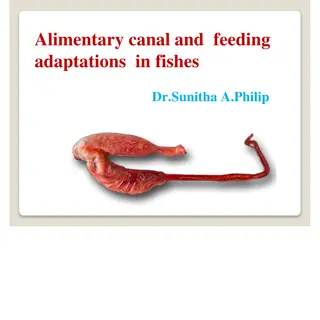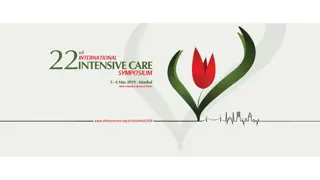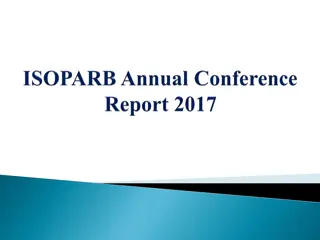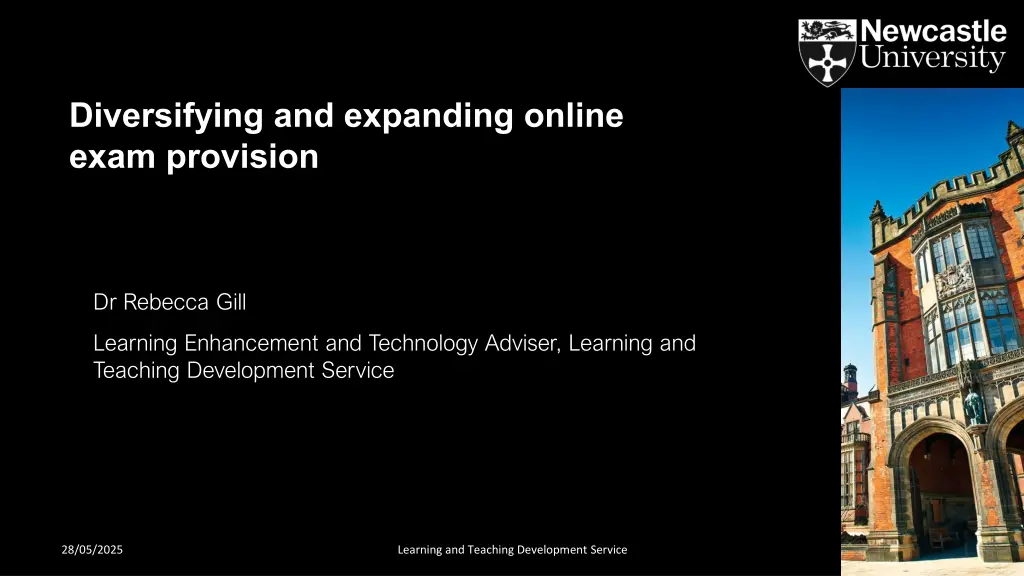
Enhancing Online Exam Provision and Assessment Expansion
Discover the journey of diversifying and expanding online exam provision, with a focus on making online summative assessment feasible across various assessment types and environments. Explore the challenges and constraints in scaling up exam delivery services, and strategies to overcome staff and space limitations along with tackling technical obstacles.
Download Presentation

Please find below an Image/Link to download the presentation.
The content on the website is provided AS IS for your information and personal use only. It may not be sold, licensed, or shared on other websites without obtaining consent from the author. If you encounter any issues during the download, it is possible that the publisher has removed the file from their server.
You are allowed to download the files provided on this website for personal or commercial use, subject to the condition that they are used lawfully. All files are the property of their respective owners.
The content on the website is provided AS IS for your information and personal use only. It may not be sold, licensed, or shared on other websites without obtaining consent from the author.
E N D
Presentation Transcript
Diversifying and expanding online exam provision Dr Rebecca Gill Learning Enhancement and Technology Adviser, Learning and Teaching Development Service 28/05/2025 Learning and Teaching Development Service 1
Technology Enhanced Learning Roadmap Key Objective 5: Make online summative assessment possible for a wide range of assessment types and in non-cluster environments Learning and Teaching Development Service 2
The story so far OLAF 28/05/2025 Learning and Teaching Development Service 3
The story so far online OLAF Service assessment and feedback 28/05/2025 Learning and Teaching Development Service 4
OLAF Service scale Number of OLAF exams delivered 180 160 140 120 100 80 60 40 20 0 2007-2008 2008-2009 2009-2010 2010-2011 2011-2012 2012-2013 2013-2014 2014-2015 2015-2016 2016-2017 2017-2018 Learning and Teaching Development Service 5
Constraints on OLAF Service expansion Staff capacity 28/05/2025 Learning and Teaching Development Service 6
Constraints on OLAF Service expansion Staff capacity Space 28/05/2025 Learning and Teaching Development Service 7
Constraints on OLAF Service expansion Staff capacity Space Technical limitations 28/05/2025 Learning and Teaching Development Service 8
28/05/2025 Learning and Teaching Development Service 9
Technology Enhanced Learning Roadmap Key Objective 5: Make online summative assessment possible for a wide range of assessment types and in non-cluster environments Learning and Teaching Development Service 10
Diversifying and expanding online exam provision 2019/20 2021/22 2018/19 2017/18 Further expansion of diversified online exam provision Pilot phase 2 Pilot exams feasibility study 28/05/2025 Learning and Teaching Development Service 11
2017/18 pilot exams feasibility study Bring Your Own Device (BYOD) Formative exam: Stage 1 Biomedical Sciences 379 students on module, 251 sat the exam Multiple choice questions (MCQs) Option to use own laptops, alternatively used University PCs Online written answer/essay Summative exams: Stage 1 Biology (101 students) and Stage 2 Psychology (38 students) Essay, MCQ, fill in the blank and short answer questions All students took first part on University PCs, option to take essay part on paper 28/05/2025 Learning and Teaching Development Service 12
Bring Your Own Device implementation 28/05/2025 Learning and Teaching Development Service 13
BYOD: student evaluation 2017/18 HOW DID YOUR EXPERIENCE OF TAKING TODAY S EXAM ON YOUR LAPTOP COMPARE TO YOUR PREVIOUS EXPERIENCE OF TAKING AN ONLINE EXAM ON A UNIVERSITY COMPUTER IN A CLUSTER? Neither better nor worse, 18% Much better, 27% Somewhat better, 55% Learning and Teaching Development Service 14
BYOD: what did students think? Felt the browser was easier to look at - eyes were not feeling strained or tired looking at it Easier to use as I frequently use my own laptop I found the software very user-friendly. The flagging a section and overview options were convenient. Biomedical Sciences Stage 1 students, 2017/18 28/05/2025 Learning and Teaching Development Service 15
BYOD: what do staff think? Transferring our ICEMI to UNIwise was a seamless process for SBMA academic and administrative staff and involved no more work than using the OLAF system. [ ] Only a small proportion of students elected to use their own devices for their exam [ ] but those who did found it useful, experienced no problems and would be happy to use their own devices again. Dr Alison Howard, Biomedical Sciences stage 1 module leader 28/05/2025 Learning and Teaching Development Service 16
BYOD: why didnt students opt in? Somewhat uncomfortable downloading unknown programs onto personal computer a mouse is easier to use when completing the exam rather than a touchpad on a laptop easier and more reliable to use university computer screen is too small because it s heavy to carry about I was worried my laptop would run out of battery/crash Biomedical Sciences Stage 1 students, 2017/18 28/05/2025 Learning and Teaching Development Service 17
Next steps in supporting BYOD online exams Take exam using own laptop as default Students without a suitable laptop sit exam in a PC cluster Student briefings and practice exams Specialist support in exam venues Power provision Back up university-owned laptops 28/05/2025 Learning and Teaching Development Service 18
Online written exam implementation 28/05/2025 Learning and Teaching Development Service 19
Online written exams: student evaluation 2017/18 HOW DID YOUR EXPERIENCE OF TAKING THE WRITTEN PART OF THE EXAM ON COMPUTER COMPARE TO YOUR PREVIOUS EXPERIENCES OF TAKING WRITTEN EXAMS ON PAPER? Much worse 3% Somewhat worse 8% Much better 30% Neither better nor worse 24% Somewhat better 35% 28/05/2025 Learning and Teaching Development Service 20
Online written exams: what do students think? I feel it helped me structure my answer more clearly and cohesively Biology Stage 1 student, 2017/18 It was something I was nervous for, however I actually feel it really helped and I would definitely want to do my essay on the computer again. Psychology Stage 2 student, 2017/18 Makes more sense to type as most things are typed now. It's faster and great to have spell check Psychology Stage 2 student, 2017/18 28/05/2025 Learning and Teaching Development Service 21
Marking online written exams 28/05/2025 Learning and Teaching Development Service 22
Online written exams: what do staff think? I believe that the ease of reading each paper actually led to fairer marking. Students with poor handwriting or poor writing skills are often given the benefit of doubt and this bias disappeared. Annotations/corrections/comments are easy to make Dr Gabriele Jordan, Psychology stage 2 module leader 28/05/2025 Learning and Teaching Development Service 23
The next chapter: pilot phase 2 2018/19 Bring your own device exams opt out model Further online written/essay exam pilots, combine with BYOD Exams using new question types not available in Blackboard Whitelisting web pages in locked down exams 28/05/2025 Learning and Teaching Development Service 24
To be continued To discuss participating in the Diversifying and Expanding Online Exam Provision project contact rebecca.gill@ncl.ac.uk Tell us about your future online exam requirements by competing this form: https://tinyurl.com/NCLonlineexam 28/05/2025 Learning and Teaching Development Service 25


